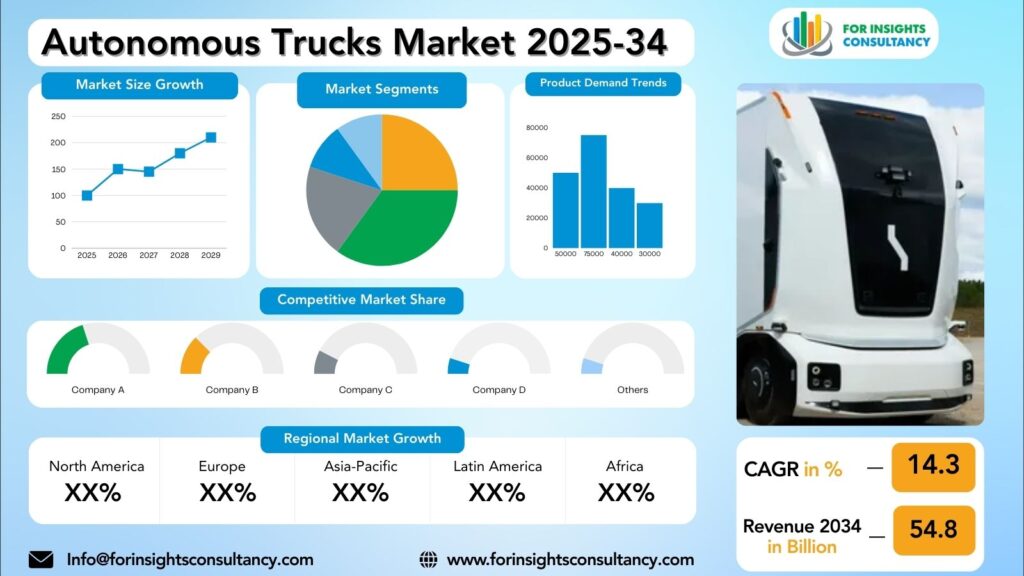
Autonomous Trucks Market Research Report by Level of Autonomy (SAE Level 1 & 2 (Driver Assistance), SAE Level 3 (Conditional Automation), SAE Level 4 (High Automation), SAE Level 5 (Full Automation)), by Component (Hardware (Sensors, Cameras, LiDAR, RADAR, Ultrasonic), Software), by Truck Type, by End-Use Application, and by Region Global Market Analysis and Forecast, 2025-2034
Sep-2025 Formats | PDF | Category: Automotive | Delivery: 24 to 72 Hours
Autonomous Trucks Market is forecast to increase from USD 54.8 Billion in 2025 to USD 165.9 Billion by 2034, at a CAGR of 14.3%.
Autonomous Trucks Market: A Comprehensive Overview and Future Developments
Autonomous trucks, also known as self-driving trucks, are vehicles equipped with advanced sensor and mapping technologies that operate without human intervention. These trucks can navigate roads, avoid obstacles, and make real-time decisions to optimize routes and maximize efficiency. Companies like Tesla, Waymo, Uber, and TuSimple are leading the way in developing autonomous trucks, investing heavily in research and development.
The adoption of autonomous trucks offers numerous benefits for businesses and consumers. Advanced sensor technologies enable them to detect potential hazards faster than human drivers, reducing accident risks. Additionally, autonomous trucks can optimize routes, reduce fuel consumption, and lower operating costs for businesses.
As technology evolves, the autonomous trucks market is expected to see further advancements, including platooning, where multiple autonomous trucks drive closely together to reduce air resistance and improve fuel efficiency. Advancements in artificial intelligence and machine learning will enable autonomous trucks to make more complex decisions on the road.
Autonomous Trucks Market Dynamics
Growth Drivers
The autonomous truck market is driven by technological advancements, such as artificial intelligence and sensor systems, which enable them to navigate roads safely and efficiently. These trucks use sophisticated algorithms and real-time data processing to make quick decisions, ensuring seamless operations. Autonomous trucks also enhance safety and efficiency, with features like collision avoidance systems and adaptive cruise control reducing accident risks. They optimize routes, reduce fuel consumption, and minimize delivery times, enhancing logistics operations.
Autonomous trucks also offer cost savings and operational benefits for transportation companies, eliminating the need for human drivers, reducing labor costs, insurance premiums, and maintenance expenses. They can operate around the clock without rest breaks, resulting in faster delivery times and improved customer satisfaction.
The growing focus on sustainability and environmental conservation is also driving the adoption of autonomous trucks. With enhanced fuel efficiency and reduced emissions, autonomous trucks are more environmentally friendly than traditional diesel-powered vehicles, promoting a greener future.
Restraints
The autonomous trucks market has experienced significant growth in recent years, with technological advancements enabling trucks to operate without human intervention. However, the market faces several challenges, including high initial costs, regulatory hurdles, and safety concerns. The high initial cost of implementing autonomous technology, including sensors, cameras, and software, can be prohibitively expensive, making it difficult for fleet owners to justify the investment. However, as the technology matures and becomes more widely adopted, costs may decrease, making autonomous trucks a more viable option for businesses of all sizes.
The complex regulatory environment surrounding autonomous vehicles is another significant restraint, as governments are still developing and enacting legislation to govern their operation. This uncertainty can be challenging for businesses looking to adopt the technology. To truly take off, regulators must create a clear and consistent framework for safe and efficient operation of autonomous trucks on public roads.
Safety is another significant concern, as while proponents argue that autonomous technology can reduce accidents by eliminating human error, there are still many questions surrounding the safety of autonomous vehicles, particularly in complex and unpredictable driving situations. Companies developing autonomous trucks must demonstrate their technology’s safety and reliability to gain trust from businesses and consumers.
Opportunities
The autonomous trucks market offers numerous opportunities for growth and innovation. It can lead to increased efficiency, cost savings, safety improvements, and environmental benefits. Autonomous trucks can operate 24/7, reducing labor costs and improving fuel efficiency, thereby increasing profitability. They can also reduce road accidents, making transportation safer for drivers and other road users. Additionally, autonomous trucks can help companies meet sustainability goals by reducing their carbon footprint. The market is also driving innovation in connected vehicles, smart infrastructure, and data analytics, giving companies a competitive edge and a position for future success.
Challenges
The Autonomous Trucks Market faces several challenges, including navigating complex regulations and legislation, safety concerns, infrastructure readiness, data security and privacy, and cost of implementation. Companies must collaborate with government agencies to develop policies that ensure the safe operation of autonomous trucks while allowing for technological advancements.
Safety is a top priority, but concerns remain about autonomous vehicles’ ability to navigate complex road conditions and handle unexpected situations. Companies must invest in advanced sensors, artificial intelligence, and machine learning algorithms to improve safety features and minimize accident risks. Infrastructure readiness is another challenge, with roads, highways, and transportation systems needing to be equipped with the necessary technology to communicate with autonomous trucks.
Companies must work with government agencies and stakeholders to invest in infrastructure upgrades. Data security and privacy are also crucial, as autonomous trucks rely on data and connectivity. Implementing autonomous trucks can be costly, with substantial upfront investments in research, development, testing, and deployment. Companies must carefully weigh the costs and benefits of transitioning to autonomous trucks and develop a comprehensive strategy for cost-effective implementation.
Autonomous Trucks Market Top Companies Covered In This Report:
Evaluate The Strategic Positioning And Innovation Pipelines Of Leading Market Companies-From Multinational Enterprises To Disruptive Regional Firms. Understand How Key Players Are Innovating, Expanding, And Capturing Value, And Use Competitive Benchmarks To Plan Your Next Move.
- Daimler Truck AG (Germany)
- AB Volvo (Sweden)
- Scania (Sweden)
- Volvo Autonomous Solutions (VAS)
- Robert Bosch GmbH (Germany)
- Continental AG (Germany)
- Denso Corporation (Japan)
- Aurora Innovation Inc. (US)
Autonomous Trucks Market News
Daimler Truck AG (with subsidiary Torc Robotics)
In April 2025, Daimler Truck delivered the latest iteration of its autonomous-ready Freightliner Cascadia to its subsidiary, Torc. This marked a key milestone in their joint efforts to enter the U.S. market with SAE Level 4 autonomous trucks by 2027.
Aurora
In early September 2025, Aurora announced a new partnership with McLeod Software to integrate its autonomous technology with McLeod’s Transportation Management System (TMS). This collaboration allows McLeod’s 1,200+ trucking clients to easily manage autonomous shipments, making it easier for them to adopt self-driving trucks.
Volvo Autonomous Solutions (VAS)
In July 2025, Volvo Autonomous Solutions highlighted its long-term strategy of building a single, scalable platform that can be deployed across all Volvo brands. This platform-based approach allows them to integrate with multiple virtual drivers, including Aurora, for on-road applications, while also developing their own virtual driver for off-road environments like mining and quarrying.
Segmented View of the Industry:
The Autonomous Trucks Market Is Mapped Through A Multidimensional Lens-Tracking Shifts Across Product Type, Applications, And Geographic Regions. This Segmented Approach Enables Businesses To Localize Their Growth Plans And Align Offerings With The Most Profitable Demand Centers.
Segmentation by Level of Autonomy
- SAE Level 1 & 2 (Driver Assistance)
- SAE Level 3 (Conditional Automation)
- SAE Level 4 (High Automation)
- SAE Level 5 (Full Automation)
Segmentation by Component
- Hardware (Sensors, Cameras, LiDAR, RADAR, Ultrasonic)
- Software
Segmentation by Truck Type
- Light-Duty
- Medium-Duty
- Heavy-Duty
Segmentation by End-Use Application
- Logistics & Freight Transport
- Mining
- Construction & Manufacturing
- Last-Mile Delivery
Global Geographic Coverage:
The Report Provides In-Depth Qualitative and Quantitative Data On the Autonomous Trucks Market For All Of The Regions And Countries Listed Below:
North America
The United States and Canada are leading the way in autonomous truck technology, with companies like Waymo and TuSimple developing advanced self-driving systems. The US has seen a significant increase in testing and deployment of autonomous trucks, particularly in California and Texas. Canada is investing in infrastructure and regulations to support the growth of self-driving vehicles, with companies like Blackberry QNX and Clearpath Robotics developing solutions tailored to the country’s unique terrain and weather conditions. The autonomous truck market in North America is thriving, with the US and Canada leading the way in innovation and adoption. As technology advances and regulations evolve, autonomous trucks are poised to revolutionize the transportation industry, offering a glimpse into a future where driverless vehicles dominate the roads.
Europe
The European Union (EU) is leading the way in adopting autonomous trucks due to strict emissions and road safety regulations. Countries like Germany, France, and the Netherlands are showing significant interest in implementing this technology. The EU is investing heavily in research and development to enhance the capabilities of autonomous trucks in the region. Germany, with major manufacturers like Daimler and MAN, is leading the way in implementing autonomous technology due to its advanced infrastructure and skilled workforce.
France, with companies like Renault Trucks and Volvo Group, is also actively testing and deploying autonomous vehicles. France’s commitment to reducing carbon emissions and promoting sustainable transportation has driven the adoption of autonomous technology. The Netherlands, with companies like TomTom and TNO, is a hub for innovation in autonomous driving technology due to its flat terrain and well-maintained road infrastructure. Dutch regulations are also favorable, allowing for extensive testing and deployment in real-world scenarios. The Autonomous Trucks Market in Europe is experiencing rapid growth and expansion.
Asia Pacific
China leads the autonomous trucks market in the Asia Pacific region, investing heavily in research and development to improve road safety and reduce transportation costs. Companies like FAW, Dongfeng, and CAMC are leading the way in developing and deploying autonomous truck solutions. Japan, with its strong automotive industry and innovation culture, is an ideal market for autonomous truck technology. Companies like Toyota, Isuzu, and Hino are developing solutions tailored to the unique needs of the Japanese market. The government’s support for research and development in autonomous vehicle technology is driving market growth. South Korea, with its strong technological infrastructure and skilled workforce, is emerging as a significant player in the market. Companies like Hyundai and Kia are investing in autonomous truck technology to stay competitive. The government’s initiatives to promote autonomous vehicle testing and deployment are also fueling market growth.
Middle East and Africa
The Middle East, with its vast deserts and long highways, is embracing autonomous trucks to enhance logistics and transportation capabilities. Countries like Saudi Arabia, UAE, and Qatar are investing heavily in infrastructure development to support the deployment of autonomous trucks, paving the way for a more efficient and sustainable transportation system. Saudi Arabia’s Vision 2030 plan includes the adoption of autonomous trucks to improve road safety and reduce traffic congestion. UAE is also investing in smart transportation solutions, with autonomous trucks playing a key role in their ambitious plans for the future.
Africa, with its diverse landscape and challenging terrain, presents unique opportunities for autonomous trucks to make a significant impact. Countries like South Africa, Nigeria, and Kenya are exploring the potential of self-driving vehicles to enhance their logistics and distribution networks. South Africa is testing autonomous trucks in mining operations to transport goods more effectively and safely, while Nigeria is looking to improve its supply chain efficiency and reduce transportation costs.
Reasons to Buy:
- The Research Would Help Top Administration/Policymakers/Professionals/Product Advancements/Sales Managers And Stakeholders In This Market In The Following Ways.
- The Report Provides Autonomous Trucks Market Revenues At The Worldwide, Regional, And Country Levels With A Complete Analysis To 2034 Permitting Companies To Analyze Their Market Share And Analyze Projections, And Find New Markets To Aim For.
- To Understand The Most Affecting Driving And Restraining Forces In The Market And Their Impact On The Global Market.
- Major Changes And Assessment In Market Dynamics And Developments.
- The Objective Of The Autonomous Trucks Market Report Is To Identify New Business Opportunities Using Quantitative Market Forecasts.
- Formulate Sales And Marketing Strategies By Gaining An Understanding Of Competitors, Their Positioning, And Strengths & Weaknesses.
Faq – What Global Leaders Are Asking
What Is The Growth Prospect For The Autonomous Trucks Market By 2034?
Autonomous Trucks Market Is Expected To Achieve A Stable Growth Rate With A Compound Annual Growth Rate (Cagr) Of About 14.3% From 2025 Through 2034.
What Is Driving The Growth Of The Autonomous Trucks Market?
The growth of the autonomous trucks market is primarily driven by the severe shortage of truck drivers and the potential for significant cost savings in fuel and labor. This is further fueled by the rising demand from the e-commerce and logistics sectors for more efficient, 24/7 freight transport.
Who Are The Key Players In The Autonomous Trucks Market, And What Are Their Market Shares?
The Autonomous Trucks Market Includes Major Companies Like Daimler Truck AG (Germany), AB Volvo (Sweden), Scania (Sweden), Volvo Autonomous Solutions (VAS), Robert Bosch GmbH (Germany), Continental AG (Germany), Denso Corporation (Japan), Aurora Innovation Inc. (US), Others.
Specific Market Share Data Is Not Publicly Available and Is Typically Provided In Detailed, Proprietary Market Research Reports.
Which Regions Are Leading the Autonomous Trucks Market Growth?
North America currently leads the autonomous trucks market due to a high demand for logistics efficiency and a favorable regulatory environment in key states like Texas and Arizona. The Asia-Pacific region is the fastest-growing market, with China poised to become a major leader due to strong government support and rapid investments in technology.
Customization: We Can Provide Following Things
1) On Market More Company Profiles (Competitors)
2) Data About Particular Country Or Region
3) We Will Incorporate The Same With No Additional Cost (Post Conducting Feasibility).
Any Requirement Contact Us: Https://Www.Forinsightsconsultancy.Com/Contact-Us/
Table of Contents
For TOC Contact us: https://forinsightsconsultancy.com/contact-us/






